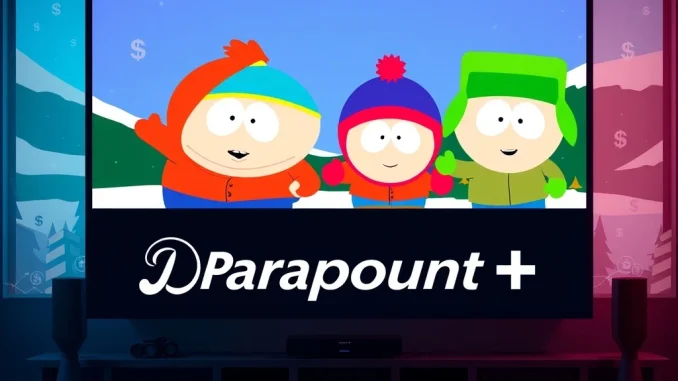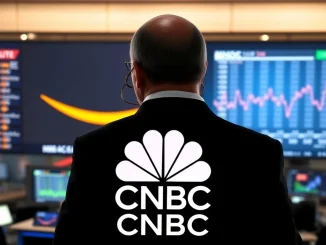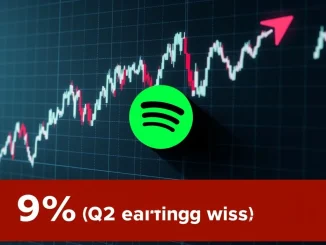
In the fast-evolving digital landscape, where the value of intellectual property and strategic investments mirrors the volatility and potential of digital assets, major players are making bold moves. Just as enthusiasts keenly observe shifts in blockchain projects and NFT valuations, the traditional media industry is undergoing its own transformative period. Paramount Global recently demonstrated this with a groundbreaking $1.5 billion South Park streaming deal, a strategic maneuver that highlights the immense value of established content in the ongoing ‘streaming wars’ – a battle for digital eyeballs as intense as any crypto market cycle.
Paramount Global’s Bold Bet: Why South Park?
The media giant, Paramount Global, has made a decisive move by securing the global streaming rights for South Park in a five-year, $1.5 billion agreement with creators Matt Stone and Trey Parker. This isn’t just another content deal; it’s a high-stakes shift designed to fortify Paramount+’s position in the fiercely competitive streaming market. The deal ensures exclusive distribution of the entire South Park catalog on Paramount+ and commits to 10 new episodes annually.
- Strategic Acquisition: Replaces HBO Max as the show’s streaming partner after its June 2025 contract expired.
- Proven Profitability: South Park ranks as the 18th-highest-grossing TV series of all time, boasting 27 seasons on Comedy Central and a robust cultural following.
- IP Control: This move signifies Paramount’s aggressive push to bring high-profile intellectual property in-house, moving away from reliance on third-party platforms.
Navigating the Streaming Strategy: A High-Stakes Game
Paramount’s new streaming strategy is unfolding amidst significant corporate restructuring. While the company is pursuing a proposed $3.6 billion merger with Skydance Media, the South Park deal showcases a clear focus on leveraging profitable content. This investment stands in stark contrast to recent cost-cutting measures, such as the cancellation of ‘The Late Show with Stephen Colbert’ in July 2025, a decision attributed to its reported $40–50 million annual losses.
This duality in Paramount’s financial priorities underscores the challenges of balancing legacy content with new ventures. The South Park investment is viewed as a safer bet given the show’s consistent viewership and diverse monetization potential through subscriptions, merchandising, and syndication. The five-year deal’s structure, with $300 million annually, also offers financial flexibility amidst the uncertainties surrounding the proposed Skydance merger.
Strategic Investment Comparison: South Park vs. The Late Show
| Aspect | South Park Streaming Deal | The Late Show with Stephen Colbert Cancellation |
|---|---|---|
| Investment/Loss | $1.5 billion over 5 years (investment) | $40-50 million annual losses (cancellation) |
| Strategic Goal | Secure exclusive, profitable IP for Paramount+ | Cost-cutting, eliminate unprofitable ventures |
| Audience Appeal | Proven, consistent viewership, cultural relevance | Declining viewership, high production costs |
| Long-term Vision | Build proprietary streaming library, drive subscriptions | Streamline operations, improve profitability |
The Future of Content Rights: What Does This Mean for the Media Industry?
The South Park deal exemplifies a broader trend in the media landscape: legacy companies are doubling down on exclusive content rights to gain a competitive edge in the streaming arena. By bringing South Park in-house, Paramount aims to differentiate Paramount+ from rivals like HBO Max, which previously hosted the show. This decision also aligns with Stone and Parker’s desire for creative and financial oversight over their highly successful franchise.
Analysts note that the creators’ leverage in these negotiations stems from South Park’s enduring relevance and their willingness to withhold content from competing platforms. This agreement builds upon a prior $900 million partnership from 2021 that funded 14 seasons and streaming specials, signaling a continued strategic alignment between the creators and Paramount.
Beyond South Park: Broader Media Industry Trends
This significant investment by Paramount Global is a microcosm of larger media industry trends. Companies are increasingly prioritizing ownership of premium content to attract and retain subscribers. The battle for exclusive shows and movies is intensifying, turning intellectual property into a crucial digital asset. Paramount’s 2024 revenue of $29 billion, despite facing losses from high-cost productions, highlights the scale of operations in this evolving market. The move towards exclusive content is a clear signal that the future of streaming relies heavily on unique, compelling libraries that cannot be found elsewhere.
The acquisition of South Park streaming rights is more than just a financial transaction; it’s a strategic declaration by Paramount Global. It underscores the immense value of established intellectual property in the digital age and the lengths to which media companies will go to secure their future in the competitive streaming wars. By bringing a beloved, profitable franchise like South Park exclusively to Paramount+, the company is making a clear statement about its commitment to growth, subscriber acquisition, and long-term dominance in the entertainment industry. This pivotal move sets a precedent for how content will be valued and distributed in the years to come, influencing the broader landscape of media and entertainment.
Frequently Asked Questions (FAQs)
Q1: What are the key terms of the South Park streaming deal?
The deal is a $1.5 billion, five-year agreement for global streaming rights, granting Paramount+ exclusive access to the entire South Park catalog and committing to 10 new episodes annually.
Q2: Why did Paramount Global choose to invest heavily in South Park while canceling ‘The Late Show with Stephen Colbert’?
The decision is based on financial rationale and strategic value. South Park is a proven, highly profitable intellectual property with consistent viewership and monetization potential, making it a safer long-term investment. The cancellation of ‘The Late Show’ was a ‘purely financial decision’ due to its reported annual losses.
Q3: How does this deal impact HBO Max?
The agreement replaces HBO Max as South Park’s streaming partner, as its contract expired in June 2025. This means South Park’s entire catalog and future episodes will now be exclusively available on Paramount+.
Q4: What does this mean for Paramount Global’s overall streaming strategy?
This deal signifies a major shift towards controlling high-profile intellectual property and bringing it in-house to differentiate Paramount+ from competitors. It’s a key part of their strategy to drive subscriber growth and build a robust, exclusive content library.
Q5: How does this deal reflect broader media industry trends?
It highlights the industry’s increasing focus on exclusive content acquisition to compete in the streaming landscape. Legacy media companies are investing heavily in proprietary content to attract and retain subscribers, viewing intellectual property as a crucial asset.



